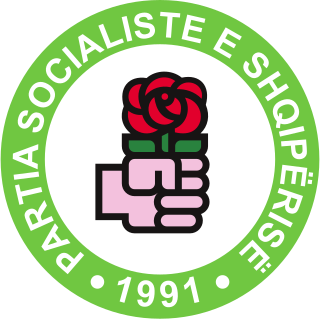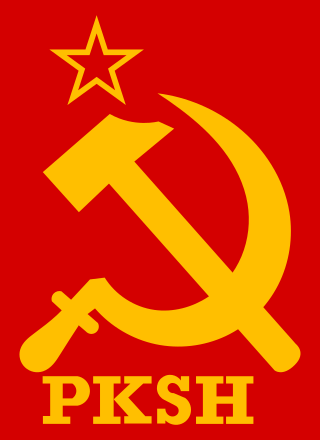| |||||
| Decades: | |||||
|---|---|---|---|---|---|
| See also: | Other events of 2005 List of years in Albania | ||||
The following lists events that happened during 2005 in the Republic of Albania .
| |||||
| Decades: | |||||
|---|---|---|---|---|---|
| See also: | Other events of 2005 List of years in Albania | ||||
The following lists events that happened during 2005 in the Republic of Albania .

Albania, officially the Republic of Albania, is a country in Southeast Europe. It is in the Balkans, on the Adriatic and Ionian Seas within the Mediterranean Sea, and shares land borders with Montenegro to the northwest, Kosovo to the northeast, North Macedonia to the east and Greece to the south. With an area of 28,748 km2 (11,100 sq mi), it has a varied range of climatic, geological, hydrological and morphological conditions. Albania's landscapes range from rugged snow-capped mountains in the Albanian Alps and the Korab, Skanderbeg, Pindus and Ceraunian Mountains, to fertile lowland plains extending from the Adriatic and Ionian seacoasts. Tirana is the capital and largest city in the country, followed by Durrës, Vlorë, and Shkodër.

Kosovo, officially the Republic of Kosovo, is a country in Southeast Europe with partial diplomatic recognition. Kosovo lies landlocked in the centre of the Balkans, bordered by Serbia to the north and east, North Macedonia to the southeast, Albania to the southwest, and Montenegro to the west. Most of central Kosovo sits on the plains of Metohija and the Kosovo field. The Accursed Mountains and Šar Mountains rise in the southwest and southeast, respectively. Kosovo's capital and largest city is Pristina.

The State Union of Serbia and Montenegro or simply Serbia and Montenegro, known until 2003 as the Federal Republic of Yugoslavia, FR Yugoslavia (FRY) or simply Yugoslavia, was a country in Southeast Europe located in the Balkans that existed from 1992 to 2006, following the breakup of the Socialist Federal Republic of Yugoslavia. The country bordered Hungary to the north, Romania to the northeast, Bulgaria to the southeast, North Macedonia to the south, Croatia and Bosnia and Herzegovina to the west, and Albania to the southwest. The state was founded on 27 April 1992 as a federation comprising the Republic of Serbia and the Republic of Montenegro. In February 2003, it was transformed from a federal republic to a political union until Montenegro seceded from the union in June 2006, leading to the full independence of both Serbia and Montenegro.

Sali Ram Berisha is an Albanian cardiologist and conservative politician who served as the president of Albania from 1992 to 1997 and 32nd prime minister from 2005 to 2013. Berisha serves as Chairman of the Democratic Party of Albania since 2022 and has held the position previously from 1990 to 2013. He also serves as the incumbent Leader of Opposition in the Albanian parliament.

Fatos Thanas Nano is an Albanian socialist politician who served as Prime Minister of Albania in 1991, from 1997 to 1998 and from 2002 to 2005. He was the first leader and founder of the Socialist Party of Albania and a member of the Albanian Parliament from 1991 to 1993 and 1997 to 2009. He reformed the anti-revisionist Marxist-Leninist ideology of the Labor Party of Albania into social democracy for its successor, the Socialist Party. During his leadership, the Socialist Party, as a result of reforms, joined the Socialist International and Party of European Socialists. Nano was a candidate in the 2007 presidential election but did not win. He again tried in the 2012 presidential election, but he did not even qualify as a candidate, because the leaders of parties in Parliament obstructed their respective MPs to elect him as candidate in the elections.

The Socialist Party of Albania is a social-democratic political party in Albania. It has been described as centre-left. It was founded on 13 June 1991. The PS is an associate of the Party of European Socialists and a member of the Socialist International, and holds pro-European views.

The Democratic Party of Albania is a conservative political party in Albania. It has been the largest opposition party in the country since 2013.

The Republican Party of Albania is a national-conservative political party in Albania. It currently holds 3 of the 140 seats in the Parliament of Albania, in alliance with the Democratic Party of Albania.

The Unity for Human Rights Party is a social-liberal political party in Albania supporting the Greek minority. Founded in 1992, it represents Albania's minorities and is mainly related to the Greek minority, and is the political continuation of Omonoia. It works with Omonoia, MEGA and other Greek parties in Albania at national elections, under a Greek bloc. The party is currently led by Vangjel Dule, who holds the party's only seat in Parliament.

Ilir Rexhep Meta is an Albanian politician. He served as the president of Albania from 24 July 2017 to 24 July 2022.

Parliamentary elections were held in Albania on 3 July 2005. The result was a victory for the opposition Democratic Party (PD) and its allies, prominently the Republican Party (PR). Former president Sali Berisha became prime minister as a result of the election.

Albania has participated in the Eurovision Song Contest 20 times since its debut in 2004. The Albanian participant broadcaster in the contest is Radio Televizioni Shqiptar (RTSH), which select its entrant with the national competition Festivali i Këngës, a long-standing song contest that organises every year since 1962.

The Communist Party of Albania is an anti-revisionist Marxist–Leninist communist party in Albania. The party was formed in 1991, as a split from the Party of Labour of Albania which converted itself into the Socialist Party of Albania. It upholds Enver Hoxha and Hoxhaism. The party was led by Hysni Milloshi until his death in 2012.

The Freedom Party, formerly known as the Socialist Movement for Integration, is a social democratic political party in Albania. The party was formed on 6 September 2004, when Ilir Meta defected from the Socialist Party of Albania (PS). A proposal to change its logo, name and other symbols was unanimously approved at the party's National Convention (Congress) on 25 July 2022. The party is seen more socially conservative than Socialist Party of Albania.

The Kosovo national football team represents Kosovo in men's international football. The team is controlled by the Football Federation of Kosovo, the governing body for football in Kosovo, and is under the jurisdiction of FIFA globally.

Bamir Myrteza Topi is an Albanian diplomat and politician. He served as the president of Albania from July 2007 to July 2012.

Lulzim Basha is an Albanian politician and the former chairman of the Democratic Party of Albania and the former leader of the albanian opposition.

Bujar Faik Nishani was an Albanian politician. He served as the president of Albania from 24 July 2012 to 24 July 2017.

Albania debuted in the Junior Eurovision Song Contest in 2012. Radio Televizioni Shqiptar (RTSH), a member organisation of the European Broadcasting Union (EBU), has been responsible for the selection process of their participants since their debut.

The first Government of Prime Minister Sali Berisha was the 63rd ruling Government of the Republic of Albania formed on 8 September 2005. Following the 3 July 2005 election, the Democratic Party formed a center-right post-electoral alliance to make a majority of seats to Parliament and form the government. The alliance consisted of five-center-right parties led by Sali Berisha managed to create a majority of 81 deputies out of 140 in the Assembly. The new government led by Sali Berisha was voted on 8 September with 84-votes Pro, and took oath on 11 September in the presence of the President of the Republic Alfred Moisiu.